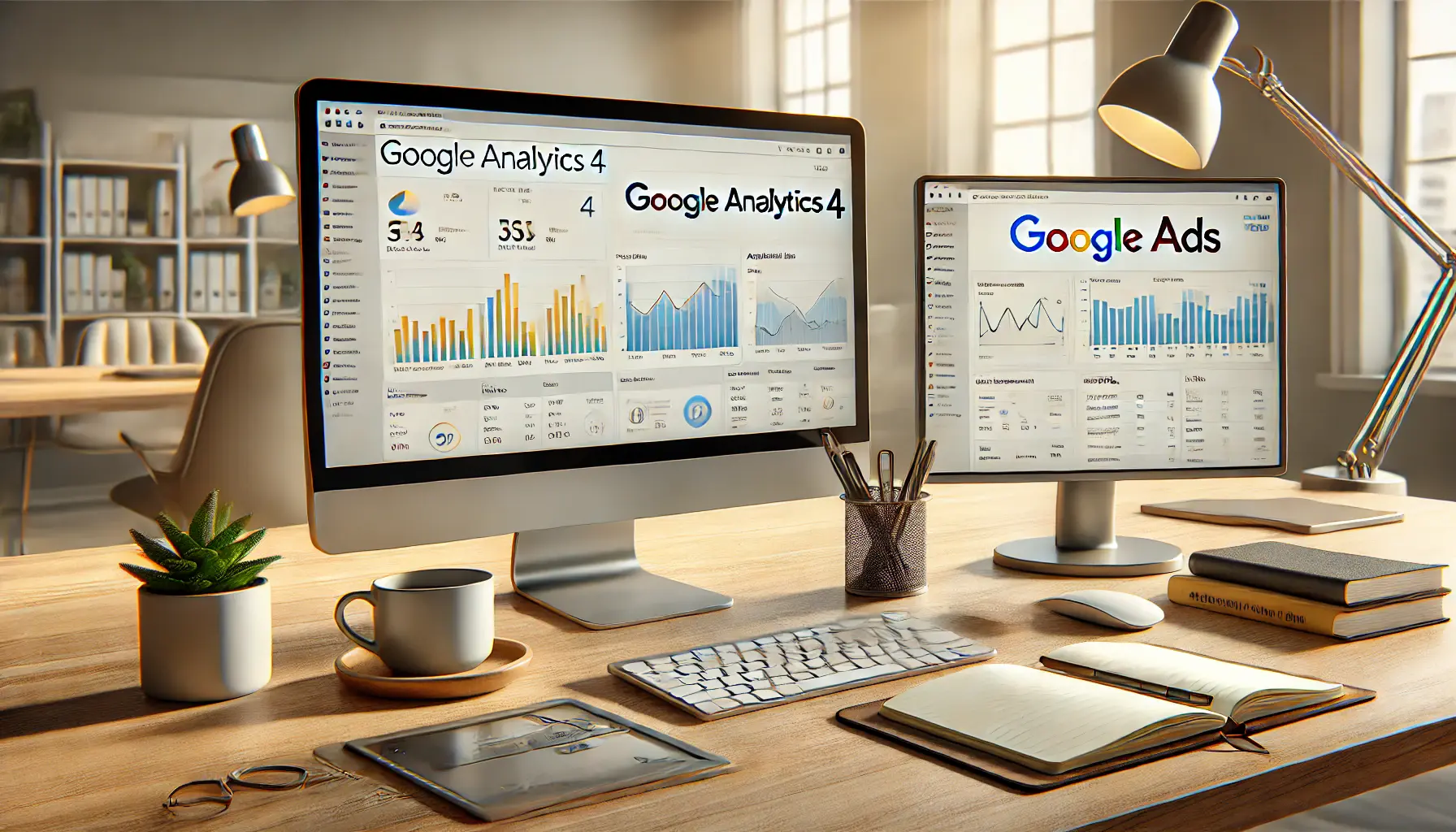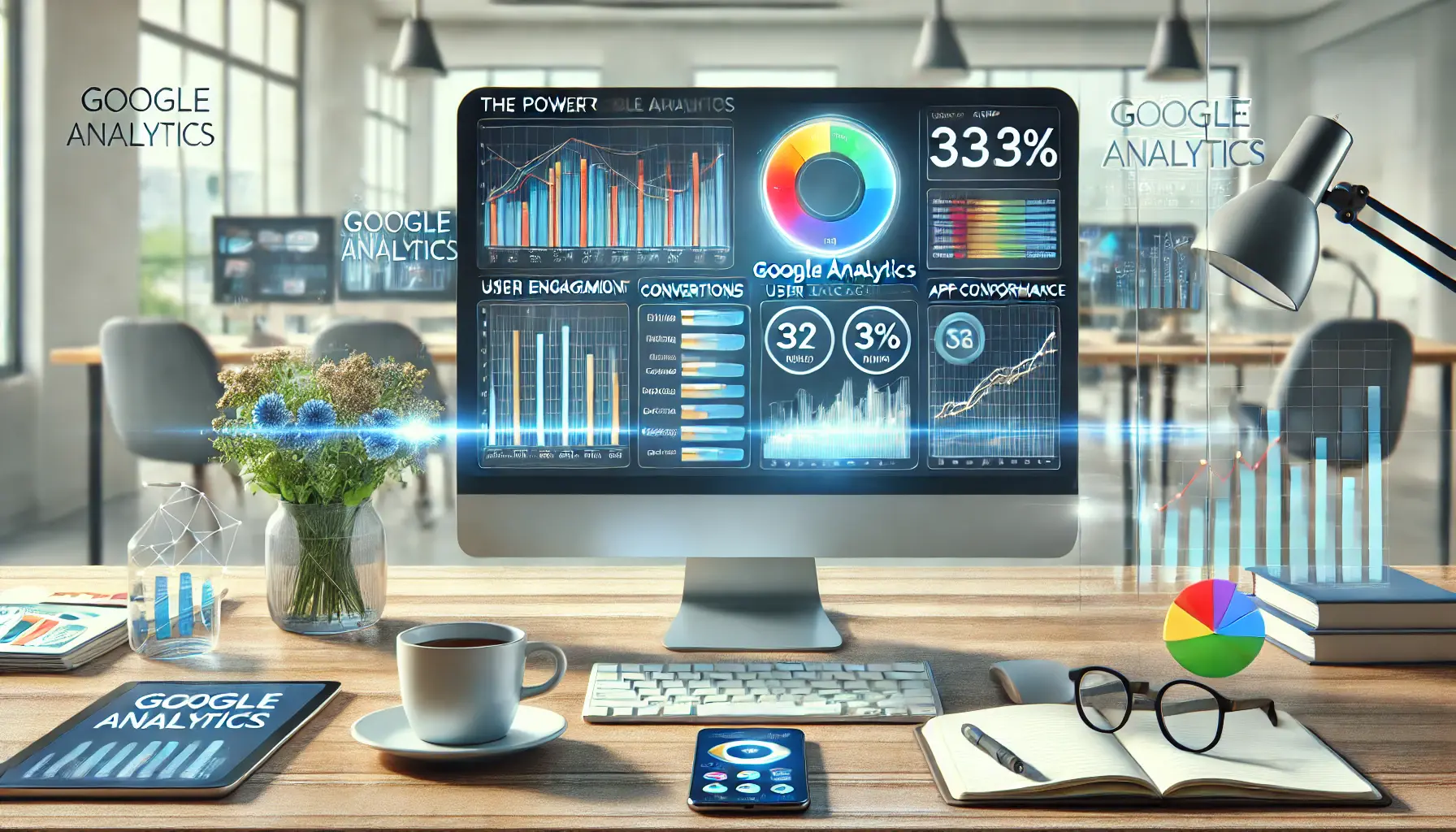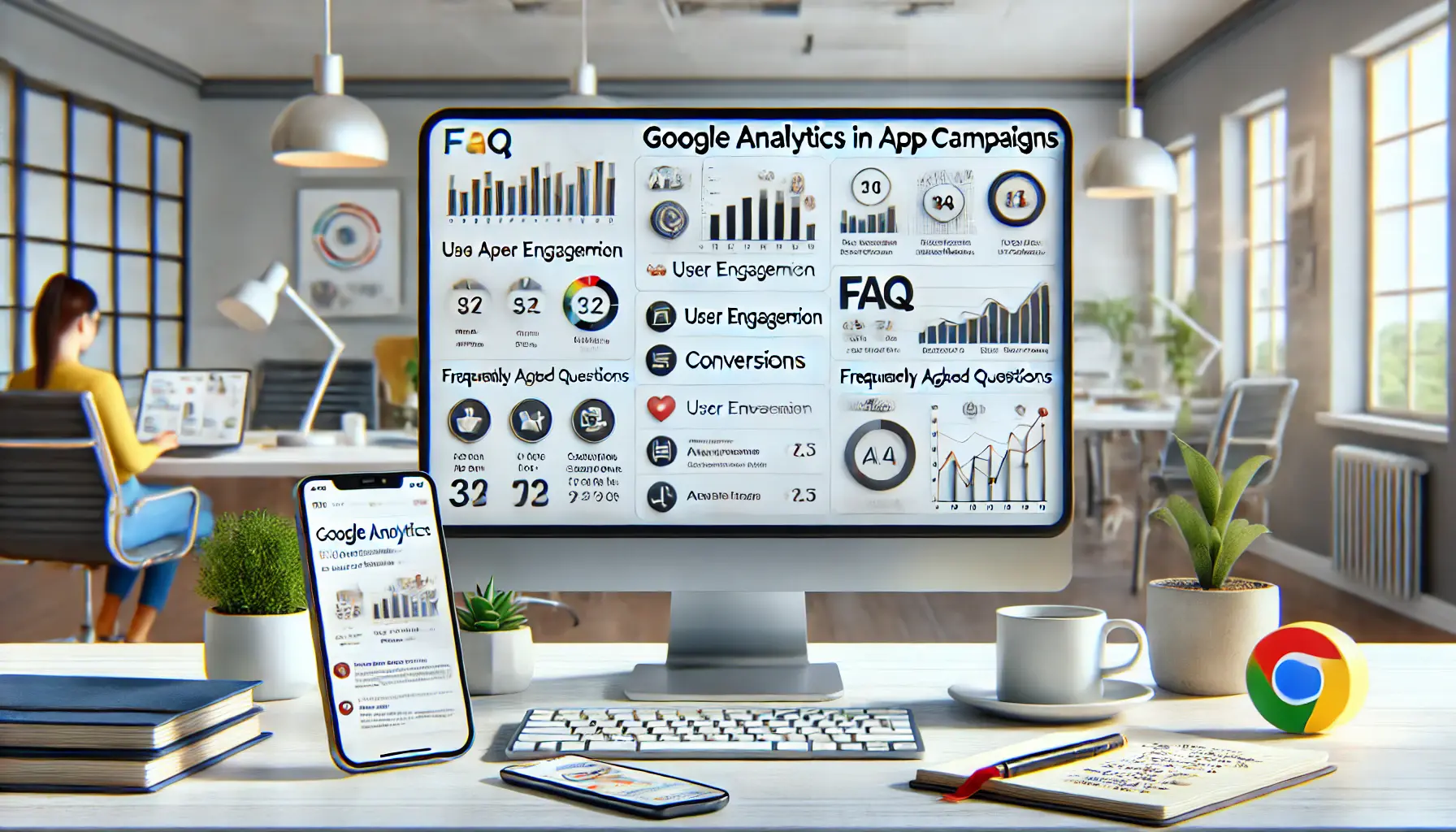In the world of rapidly evolving app advertising, understanding user behavior and campaign performance is paramount.
Google Analytics has become a cornerstone for marketers by providing powerful insights and tools to optimize app campaigns.
By mastering these capabilities, you can unleash the full potential of your app ads, ensuring they reach the right audience at the right time.
In this article, we will explore new strategies and features of Google Analytics for app campaigns.
- Integrating Google Analytics with App Campaigns
- Leveraging AI-Powered Insights in Google Analytics
- Enhancing iOS App Campaign Performance
- Optimizing User Engagement through Deep Linking
- Implementing A/B Testing for App Campaign Success
- Mastering App Campaigns with Google Analytics
- Frequently Asked Questions about Google Analytics for App Campaigns
Integrating Google Analytics with App Campaigns
Integrating Google Analytics with your app campaigns is the first step toward gaining meaningful insights and achieving measurable outcomes.
This process connects your app’s data with your advertising efforts, enabling you to track performance and refine strategies.
Let’s delve into the key elements of this integration.

Illustration of the integration between Google Analytics 4 and Google Ads in a workspace.
Linking Google Analytics 4 to Google Ads
Google Analytics 4 (GA4Short for Google Analytics 4, the latest version of Google Analytics, designed for event-based tracking and cross-platform analysis.) provides robust features for tracking app performance.
To get started, ensure your GA4 property is linked to your Google Ads account.
This connection allows you to import metrics such as conversions and user engagement into Google Ads for a comprehensive view of campaign performance.
- Navigate to your GA4 property settings and select Product Links.
- Choose Google Ads Linking and follow the on-screen instructions to complete the setup.
- After linking, import conversion events into Google Ads to enhance your bidding strategies.
Illustration of app conversion tracking setup with a laptop and smartphone connection.
Installing App Conversion Tracking
Tracking app installs is crucial for measuring your campaign’s overall performance.
Fortunately, Google Analytics supports conversions from installs to post-install behaviors seamlessly.
- Define a conversion event for app installs within your GA4 account.
- Use Google Tag Manager or Firebase SDK to implement tracking in your app.
- Verify that your events are firing correctly and reporting real-time data.

Illustration of Firebase SDK integration for enhanced app measurement in a development environment.
Utilizing Firebase SDK for Enhanced Measurement
For app-specific insights, integrating Firebase SDKA software development kit provided by Google for integrating Firebase features into apps, enabling advanced tracking and analytics. with Google Analytics is invaluable.
Firebase provides advanced tracking capabilities for in-app events, user properties, and engagement metrics.
- Download and configure the Firebase SDK in your app project.
- Use Firebase’s event logging features to track key interactions such as purchases or feature usage.
- Leverage Firebase’s predictive analytics to identify high-value users and optimize campaigns effectively.
By integrating Google Analytics properly into your app campaigns, you establish a strong foundation for data-driven decisions.
This approach not only enhances ad performance but also improves user experiences, fostering long-term growth for your app.
Integrating Google Analytics with your app campaigns allows you to link app data to advertising strategies, enabling real-time insights and optimization for measurable results.

Illustration of AI-powered insights in Google Analytics with predictive metrics on a high-tech workspace.
Leveraging AI-Powered Insights in Google Analytics
In today’s data-driven landscape, harnessing artificial intelligence (AI) within Google Analytics can significantly enhance your app campaigns.
AI-powered insights provide a deeper understanding of user behavior, enabling more informed marketing decisions.
Let’s explore how these features can elevate your strategies.

Illustration of Google Analytics predictive metrics analyzing user behavior with a professional desk setup.
Understanding Predictive Metrics for User Behavior
Google Analytics 4 introduces predictive metrics that forecast the next steps your users will take.
These include the probability of purchase and the probability of churn, enabling you to anticipate user actions and keep your campaigns on track.
Leverage these insights to focus on high-value users and implement retention strategies effectively.
- Purchase Probability: Indicates the likelihood of a user making a purchase within the next seven days.
- Churn Probability: Estimates the chance of a user disengaging from your app.

Illustration of anomaly detection in Google Analytics used for campaign optimization.
Applying Anomaly Detection to Optimize Campaigns
Anomaly detection in Google Analytics 4 identifies unexpected changes in your data, such as sudden spikes or drops in user engagement.
By promptly addressing these anomalies, you can maintain campaign performance and swiftly rectify any issues that may arise.
- Utilize the Analytics Intelligence feature to monitor anomalies in real-time.
- Investigate the root causes of anomalies to implement corrective measures.

Illustration of automated insights in Google Analytics aiding strategic decision-making.
Utilizing Automated Insights for Strategic Decisions
Google Analytics 4’s automated insights highlight significant trends and patterns within your data, offering actionable recommendations.
These insights assist in refining your marketing strategies and enhancing user engagement.
- Access automated insights directly from your Google Analytics 4 dashboard.
- Customize insights to focus on metrics that align with your business objectives.
By integrating AI-powered insights into your app campaigns, you can make data-driven decisions that enhance performance and ensure user satisfaction.
Leveraging these advanced capabilities in Google Analytics positions your marketing efforts for long-term success.
AI-powered insights in Google Analytics, such as predictive metrics and automated anomaly detection, empower marketers to anticipate user behavior and optimize campaigns proactively.

Illustration of tools and data for optimizing iOS app campaign performance.
Enhancing iOS App Campaign Performance
Optimizing your iOS app campaigns is essential for achieving better user engagement and a higher return on investment.
Leveraging tools like Google Analytics and Apple’s SKAdNetworkApple's framework for privacy-preserving app install attribution, allowing developers to measure campaign performance on iOS devices. can provide valuable insights and improve your campaign strategies.
Let’s explore key methods to enhance your iOS app campaign performance.

Illustration of implementing SKAdNetwork conversion value schema in a workspace.
Implementing SKAdNetwork Conversion Value Schema
With Apple’s SKAdNetwork, a privacy-centric way to measure app conversions is by setting up a conversion value schema and tracking in-app events important to your business.
This process involves describing conversion values in Google Analytics 4 to map your most valuable in-app events to specific values.
Configure your schema to include events you are optimizing in your app campaigns.
- Integrate the schema with your Google Ads account for improved bidding strategies.

Illustration of cross-channel attribution for iOS app campaigns in a modern workspace.
Improving Cross-Channel Attribution on iOS
Accurate attribution is crucial for understanding which channels drive app installs and user engagement.
Enhancing cross-channel attribution on iOS involves:
- Utilizing Google’s privacy-safe URL parameter, gbraid, to measure iOS app conversions from web campaigns.
- Integrating Google Analytics 4 with SKAdNetwork to obtain comprehensive install reporting and attribution.
- Continuing to use auto-tagging or manual tagging of your advertising campaign URLs across all campaigns.

Illustration of strategies for bidding on iOS app events in a professional workspace.
Strategies for Bidding on iOS App Events
Effective bidding strategies are vital for maximizing the performance of your iOS app campaigns.
Consider the following approaches:
- Set up your SKAdNetwork conversion value schema to align with the in-app events you aim to optimize.
- Enhance observable conversions by leveraging on-device conversion measurement using consented, first-party data.
- Apply Google Analytics 4 predictive metrics to inform your bidding strategy and target high-value users.
Implement these strategies to achieve high performance in your iOS app campaigns, resulting in valuable user engagement and strong returns on investment.
Optimizing iOS campaigns with tools like SKAdNetwork and cross-channel attribution ensures privacy-safe and accurate performance tracking.

Illustration of deep linking strategies to optimize user engagement in a professional workspace.
Optimizing User Engagement through Deep Linking
Enhancing user engagement is crucial for the success of your app campaigns.
Implementing deep linking strategies allows you to direct users to specific content within your app, providing a seamless and personalized experience.
Let’s explore how to set up and utilize deep linking effectively.

Illustration of setting up Universal Links for iOS in a modern office workspace.
Setting Up Universal Links for iOS
Universal Links enable iOS apps to open specific content directly.
To implement them:
- Enable the Associated Domains capability in your Xcode project.
- Add your domain to the app’s entitlements with the applinks: prefix.
- Host an apple-app-site-association file on your website to establish an association between your app and domain.
By configuring Universal LinksA feature in iOS that enables direct linking to specific app content without opening a browser. correctly, users tapping on a Universal Link are taken directly to the relevant content within your app, enhancing engagement and satisfaction.

Illustration of the proper implementation of Android App Links in a modern office workspace.
Proper Implementation of Android App Links
For Android, App Links work similarly to iOS’s Universal Links.
To set them up:
- Declare intent filters in your app’s manifest file to specify the URLs your app can handle.
- Verify your app’s domain ownership by hosting a Digital Asset Links JSON file on your server.
- Ensure your server uses HTTPS, as App Links require secure connections.
By implementing App Links, you provide a seamless pathway for users to access specific content within your app, improving the overall user experience.

Illustration of measuring deep link performance in marketing campaigns in a professional workspace.
Measuring Deep Link Performance in Campaigns
Tracking the effectiveness of your deep linking strategy is essential.
Google Analytics offers tools to monitor deep link performance:
- Set up event tracking in Google Analytics to capture data on deep link opens and user interactions.
- Analyze user flow to understand how deep-linked users navigate through your app.
- Utilize conversion tracking to measure how deep links impact key performance indicators.
By regularly analyzing this data, you can refine your deep linking strategy to enhance user engagement effectively and achieve your campaign goals.
Deep linking, when implemented and measured correctly, greatly improves user engagement in your app campaigns, resulting in higher retention rates and better overall performance.
Deep linking creates a seamless user journey by directing users to specific in-app content, boosting engagement and retention.

Illustration of A/B testing results for optimizing app campaign success in a modern workspace.
Implementing A/B Testing for App Campaign Success
To maximize the effectiveness of your app campaigns, it’s essential to understand what resonates with your audience.
A/B testing, also known as split testing, allows you to compare different versions of your app’s elements to determine which performs better.
This data-driven approach enables you to make informed decisions that enhance user engagement and conversion rates.

Illustration of key elements for app campaign testing in a modern office workspace.
Identifying Key Elements for Testing
Begin by selecting the components of your app or marketing materials that could impact user behavior.
Consider testing:
- App Store Visuals: Icons, screenshots, and video previews that influence first impressions.
- Ad Creatives: Variations in images, headlines, and call-to-action buttons.
- In-App Features: Layouts, color schemes, and navigation elements.
By focusing on these areas, you can identify which versions appeal most to your target audience.

Illustration of conducting and analyzing A/B tests for app campaigns in a modern office workspace.
Conducting Effective A/B Tests
To ensure reliable results from your A/B tests:
- Define Clear Objectives: Establish specific goals, such as increasing click-through rates or improving user retention.
- Test One Variable at a Time: Isolate individual elements to accurately attribute changes in performance.
- Ensure Statistical Significance: Run tests with a sufficient sample size to validate findings.
Following these practices helps in drawing meaningful conclusions from your tests.

Illustration of analyzing and implementing A/B test results to optimize app campaigns in a modern office workspace.
Analyzing and Implementing Test Results
After running your tests, consider the following steps:
- Review Performance Metrics: Compare conversion rates, user engagement, and revenue between variants.
- Make Data-Driven Decisions: Implement the version that demonstrates superior performance.
- Continuously Iterate: Regularly test new hypotheses to keep optimizing your app’s user experience and marketing strategies.
This iterative approach ensures that your app remains aligned with user preferences and market trends.
By systematically applying A/B testingA method of comparing two versions of a webpage, app, or campaign to determine which one performs better., you can refine your app campaigns to meet user expectations, leading to increased satisfaction and higher conversion rates.
A/B testing helps refine app elements through data-driven comparisons, improving user engagement and conversion rates effectively.

Illustration of mastering app campaigns with Google Analytics in a modern office workspace.
Mastering App Campaigns with Google Analytics
Google Analytics has proven to be an indispensable tool for enhancing app campaigns.
From tracking user behavior to optimizing ad performance, the platform empowers marketers to make data-driven decisions.
Throughout this article, we have explored critical strategies that leverage Google Analytics to unlock the full potential of your app campaigns.

Illustration of key takeaways for optimizing app campaign success in a modern office workspace.
Key Takeaways for App Campaign Success
By integrating Google Analytics into your app campaigns, you build a strong foundation for performance monitoring and improvement.
Here’s a quick rundown of the key approaches:
- Connect Google Analytics 4 to your app campaigns for accurate tracking and insights.
- Utilize AI-powered tools to predict user behavior and identify anomalies early.
- Optimize your campaigns on iOS by integrating SKAdNetwork and setting up conversion value schemas.
- Enhance user engagement through deep linking strategies like Universal Links and Android App Links.
- Utilize A/B testing to refine your app’s marketing materials and user experience.

Illustration of building a data-driven future with data analysis and trends in a modern office workspace.
Building a Data-Driven Future
Adopting these strategies ensures your campaigns remain competitive in an ever-evolving digital landscape.
Whether you are optimizing for iOS or Android, the insights gained from Google Analytics empower you to make informed decisions that resonate with your audience.
Continuous experimentation and analysis will keep your campaigns aligned with market trends and user preferences.

undefined
Embracing the Power of Google Analytics
Building successful app campaigns requires a deep understanding of your audience and the ability to adapt to their needs.
Google Analytics equips you with actionable insights at every step of the process.
Besides boosting user engagement, it fosters sustainable growth and delivers higher returns on investment when these strategies are implemented effectively.
Mastering the features of Google Analytics positions your app campaigns for long-term success, ensuring they reach their full potential in a competitive market.
Google Analytics equips marketers with powerful tools to track, optimize, and enhance app campaigns, ensuring sustainable growth and long-term success.

Illustration of a FAQ-style dashboard for Google Analytics in app campaigns in a modern office workspace.
Your campaigns can be managed by an agency specialized in Google Ads, check out our service page.
Frequently Asked Questions about Google Analytics for App Campaigns
Enhancing your app campaigns with Google Analytics will naturally raise some questions.
Below are a series of commonly asked questions with succinct answers to help improve your strategies.
Google Analytics 4 is based on an event-driven data model, enabling detailed cross-platform tracking and deeper insights compared to the session-based model used by Universal Analytics.
Linking Google Analytics 4 to Google Ads facilitates the import of key events, enabling enhanced bidding strategies and precise measurement of app campaign performance.
AI-powered insights, such as predictive metrics and anomaly detection, help marketers anticipate user behavior and identify unexpected data changes, enabling proactive campaign optimization.
Deep linking directs users to specific in-app content, offering a seamless and personalized experience that boosts engagement and satisfaction by eliminating navigation barriers.
A/B testing compares different app elements, allowing marketers to make data-driven decisions that refine user experience and improve the overall effectiveness of campaigns.
SKAdNetwork is Apple’s framework for privacy-centric app install attribution, critical for measuring and optimizing iOS campaigns while adhering to user privacy standards.
Google Analytics enables event tracking for deep link opens and user interactions, allowing analysis of user flow and conversion rates associated with deep-linked content.
Universal Links (iOS) and Android App LinksA feature in Android that allows apps to handle specific URLs and link users directly to app content. are deep linking methods that enable direct navigation to in-app content, enhancing user experience by bypassing intermediary steps.
Predictive analytics forecast user behavior, such as purchase probability, enabling marketers to target high-value users and tailor campaigns for maximum effectiveness.











